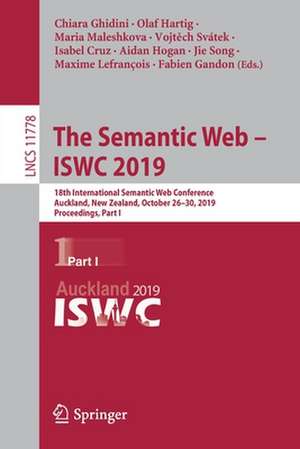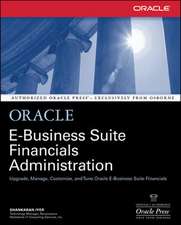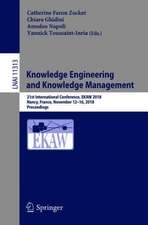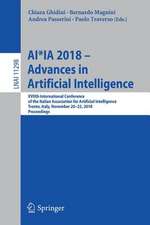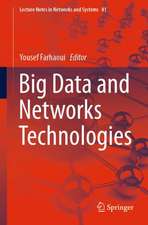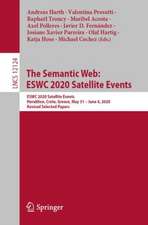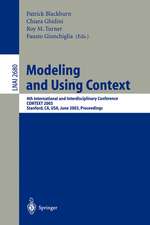The Semantic Web – ISWC 2019: 18th International Semantic Web Conference, Auckland, New Zealand, October 26–30, 2019, Proceedings, Part I: Lecture Notes in Computer Science, cartea 11778
Editat de Chiara Ghidini, Olaf Hartig, Maria Maleshkova, Vojtěch Svátek, Isabel Cruz, Aidan Hogan, Jie Song, Maxime Lefrançois, Fabien Gandonen Limba Engleză Paperback – 22 sep 2019
| Toate formatele și edițiile | Preț | Express |
|---|---|---|
| Paperback (2) | 357.15 lei 6-8 săpt. | |
| Springer International Publishing – 22 sep 2019 | 357.15 lei 6-8 săpt. | |
| Springer International Publishing – 25 sep 2019 | 546.11 lei 6-8 săpt. |
Din seria Lecture Notes in Computer Science
- 20%
 Preț: 1061.55 lei
Preț: 1061.55 lei - 20%
 Preț: 307.71 lei
Preț: 307.71 lei - 20%
 Preț: 438.69 lei
Preț: 438.69 lei - 20%
 Preț: 579.30 lei
Preț: 579.30 lei -
 Preț: 410.88 lei
Preț: 410.88 lei - 17%
 Preț: 427.22 lei
Preț: 427.22 lei - 20%
 Preț: 596.46 lei
Preț: 596.46 lei - 15%
 Preț: 448.04 lei
Preț: 448.04 lei - 20%
 Preț: 353.50 lei
Preț: 353.50 lei -
 Preț: 389.49 lei
Preț: 389.49 lei - 20%
 Preț: 309.90 lei
Preț: 309.90 lei - 20%
 Preț: 645.28 lei
Preț: 645.28 lei - 20%
 Preț: 763.23 lei
Preț: 763.23 lei - 15%
 Preț: 580.46 lei
Preț: 580.46 lei - 20%
 Preț: 310.28 lei
Preț: 310.28 lei - 20%
 Preț: 655.02 lei
Preț: 655.02 lei - 20%
 Preț: 1183.14 lei
Preț: 1183.14 lei - 20%
 Preț: 340.32 lei
Preț: 340.32 lei -
 Preț: 449.57 lei
Preț: 449.57 lei - 20%
 Preț: 591.51 lei
Preț: 591.51 lei - 18%
 Preț: 938.83 lei
Preț: 938.83 lei - 20%
 Preț: 337.00 lei
Preț: 337.00 lei - 20%
 Preț: 649.50 lei
Preț: 649.50 lei - 20%
 Preț: 607.40 lei
Preț: 607.40 lei - 20%
 Preț: 1414.79 lei
Preț: 1414.79 lei - 20%
 Preț: 1024.44 lei
Preț: 1024.44 lei - 20%
 Preț: 583.40 lei
Preț: 583.40 lei - 20%
 Preț: 453.32 lei
Preț: 453.32 lei - 20%
 Preț: 575.49 lei
Preț: 575.49 lei - 20%
 Preț: 1075.26 lei
Preț: 1075.26 lei - 20%
 Preț: 585.88 lei
Preț: 585.88 lei - 20%
 Preț: 825.93 lei
Preț: 825.93 lei - 17%
 Preț: 360.20 lei
Preț: 360.20 lei - 20%
 Preț: 763.23 lei
Preț: 763.23 lei - 20%
 Preț: 340.32 lei
Preț: 340.32 lei - 20%
 Preț: 504.58 lei
Preț: 504.58 lei - 20%
 Preț: 369.13 lei
Preț: 369.13 lei - 20%
 Preț: 580.93 lei
Preț: 580.93 lei - 20%
 Preț: 343.62 lei
Preț: 343.62 lei - 20%
 Preț: 350.21 lei
Preț: 350.21 lei - 20%
 Preț: 583.40 lei
Preț: 583.40 lei - 20%
 Preț: 583.40 lei
Preț: 583.40 lei - 15%
 Preț: 438.59 lei
Preț: 438.59 lei - 20%
 Preț: 341.95 lei
Preț: 341.95 lei - 20%
 Preț: 238.01 lei
Preț: 238.01 lei - 20%
 Preț: 538.30 lei
Preț: 538.30 lei
Preț: 357.15 lei
Preț vechi: 446.44 lei
-20% Nou
Puncte Express: 536
Preț estimativ în valută:
68.34€ • 71.36$ • 56.43£
68.34€ • 71.36$ • 56.43£
Carte tipărită la comandă
Livrare economică 16-30 aprilie
Preluare comenzi: 021 569.72.76
Specificații
ISBN-13: 9783030307929
ISBN-10: 3030307921
Pagini: 754
Ilustrații: XLIV, 754 p. 601 illus., 96 illus. in color.
Dimensiuni: 155 x 235 mm
Greutate: 1.1 kg
Ediția:1st ed. 2019
Editura: Springer International Publishing
Colecția Springer
Seriile Lecture Notes in Computer Science, Information Systems and Applications, incl. Internet/Web, and HCI
Locul publicării:Cham, Switzerland
ISBN-10: 3030307921
Pagini: 754
Ilustrații: XLIV, 754 p. 601 illus., 96 illus. in color.
Dimensiuni: 155 x 235 mm
Greutate: 1.1 kg
Ediția:1st ed. 2019
Editura: Springer International Publishing
Colecția Springer
Seriile Lecture Notes in Computer Science, Information Systems and Applications, incl. Internet/Web, and HCI
Locul publicării:Cham, Switzerland
Cuprins
Research Track.- Decentralized Indexing over a Network of RDF Peers.- Datalog Materialisation in Distributed RDF Stores with Dynamic Data Exchange.- How to make latent factors interpretable by feeding Factorization machines with knowledge graphs.- Observing LOD using Equivalent Set Graphs: it is mostly flat and sparsely linked.- Optimizing Horn-SHIQ Reasoning for OBDA.- Using a KG-Copy Network for Non-Goal Oriented Dialogues.- Canonicalizing Knowledge Base Literals.- Bag Semantics of DL-Lite with Functionality Axioms.- Validating SHACL constraints over a SPARQL endpoint.- Mapping Factoid Adjective Constraints to Existential Restrictions over Knowledge Bases.- Mining Significant Maximum Cardinalities in Knowledge Bases.- HapPenIng: Happen, Predict, Infer - Event Series Completion in a Knowledge Graph.- Uncovering the Semantics of Wikipedia Categories.- Qsearch: Answering Quantity Queries from Text.- A Worst-Case Optimal Join Algorithm for SPARQL.- Knowledge Graph Consolidationby Unifying Synonymous Relationships.- Skyline Queries over Knowledge Graphs.- Detecting Influences of Ontology Design Patterns in Biomedical Ontologies.- Popularity-driven Ontology Ranking using Qualitative Features.- Incorporating Literals into Knowledge Graph Embeddings.- Extracting Novel Facts from Tables for Knowledge Graph Completion.- Difficulty-controllable Multi-hop Question Generation From Knowledge Graphs.- Type Checking Program Code using SHACL.- Decentralized Reasoning on a Network of Aligned Ontologies with Link Keys.- Ontology Completion Using Graph Convolutional Networks.- Non-Parametric Class Completeness Estimators for Collaborative Knowledge Graphs - The Case of Wikidata.- Pretrained Transformers for Simple Question Answering over Knowledge Graphs.- Learning to Rank Query Graphs for Complex Question Answering over Knowledge Graphs.- THOTH: Neural Translation and Enrichment of Knowledge Graphs.- Entity Enabled Relation Linking.- SHACL Constraints with Inference Rules.- Query-Based Entity Comparison in Knowledge Graphs Revisited.- Anytime Large-Scale Analytics of Linked Open Data.- Absorption-Based Query Answering for Expressive Description Logics.- TransEdge: Translating Relation-contextualized Embeddings for Knowledge Graphs.- Unsupervised Discovery of Corroborative Paths for Fact Validation.- RDF Explorer: A Visual SPARQL Query Builder.- Capturing Semantic and Syntactic Information for Link Prediction in Knowledge Graphs.- A Framework for Evaluating Snippet Generation for Dataset Search.- Summarizing News Articles using Question-and-Answer Pairs via Learning.- Product Classification Using Microdata Annotations.- Truthful Mechanisms for Multi Agent Self-Interested Correspondence Selection.
